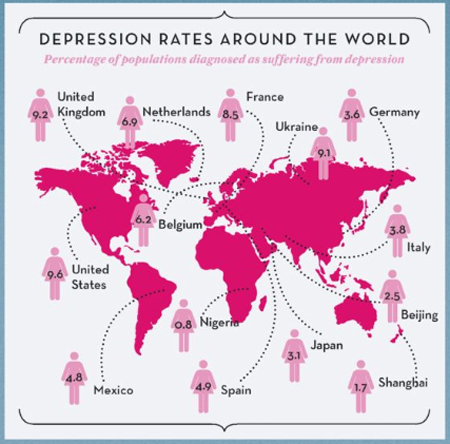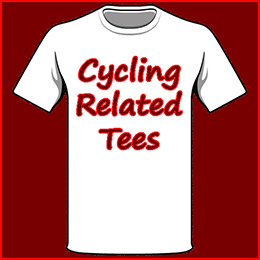Analyzing Depression
 Mon, December 3, 2018
Mon, December 3, 2018 
I came across this map of the world which shows, by country, the percentage of population diagnosed with depression.
The most depressed people it appears live in the United States, United Kingdom, Ukraine, and France. The fact that the top three all begin with the letter “U” does not go unnoticed, so it is best to avoid living in countries that begin with “U.”
Three of the top countries (USA, UK, and France.) may be the most depressed in the world, but at least they know where they are. As the depression rate drops, it seems people are less sure where in the world they belong on this map.
People in the Netherlands, for example, think they are in Iceland. Germany thinks it is in Shanghai, while Shanghai appears to be in New Zealand, and Beijing thinks it is in Iraq. People from Shanghai and Beijing are so NOT depressed that they think they are countries, when the last time I checked, they were cities.
Another country with a low depression rate is Italy, which thinks it is on the Pakistan/Afghanistan border. Could it be the people in these less depressed places have a subconscious desire to move to a more depressing place to tone down their feeling of joy. Japan, for example, thinks it is in the Persian Gulf. Maybe their desire is to be nearer the oil.
The least depressed place in the world, according to this map, is Nigeria, who, it appears, knows what continent it is on. However, it thinks it is several thousand miles away on the east coast of Africa. When last I checked it was on the west coast.
Mexico has a depression rate that is exactly half that of the United States, and it thinks it is in Brazil. It also proves my theory that less depressed people have a desire to move to places where they can be more depressed. It doesn’t matter how bad things get in America, we don’t see a mass exodus south from the US into Mexico.
We can learn a lot from maps like this, that psychologists are poor at geography for example. Of course it couldn’t be that America has the highest depression rate in the world because we have more doctors diagnosing people as depressed?
It doesn’t have anything to do with the fact that in the United States we are bombarded nightly with TV ads for anti-depressant medication. The result being that more people trot off to their doctor to sign up for said medication, when according to this map all they need to do is book a flight to Nigeria.
It also doesn’t go unnoticed that you can’t spell “Analyzing” without “Anal,” which may account for the fact that most analysts pull numbers out of their ass. It’s probably where they got their map references too.
I hope after reading this, you are now less depressed
 Humor
Humor 



















Reader Comments (7)
Ha, ha! That's pretty funny.
When I looked at the map (before reading the article), I was puzzled about a couple of the 'locations' of the places. I didn't catch all of the mistakes like you did. :)
On a more serious note, the depression rates in first-world countries are likely higher (at least in part) because of higher likelihood of diagnosis (as you correctly pointed out). Culture may also play a part in it. Simpler, less westernized cultures, seem to be less prone to depression - but they may also have greater stigma associated with reporting depression leading to 'lower' depression rates.
Anyway, that map is a hoot!
That is pretty depressing
No wonder the Ukrainians are depressed, they're right on the Arctic circle now.
I managed to get through life without getting depressed, fired, or working very hard....(well....30 years of race results often made me depressed)
Thanks, You have made me feel much better.
studiies have also found that most people who study depression rates around the world failed grade school geography.
"Of course it couldn’t be that America has the highest depression rate in the world because we have more doctors diagnosing people as depressed?"
Hammer, meet nail head.
Of course while that doesn't mean we don't have the best healthcare in the world, it could very well be a big reason why we have the most expensive healthcare in the world.
All those Happy Pills ain't gonna pay for themselves, after all. Pass the goofballs, please.